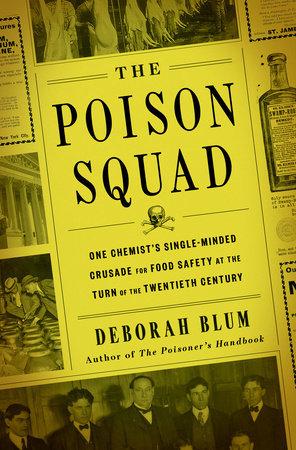Harvey Washington Wiley was born in a log cabin on April 16, 1844, a fitting entrance for an American hero. His father was a farmer and a lay preacher in southern Indiana who sheltered escaped slaves as part of the Underground Railroad. Wiley served briefly in the Civil War, studied medicine in Indiana and chemistry at Harvard, and became the first chemistry professor at Purdue University in 1874.

The deliberate adulteration of food had been a problem for millenniums, inspiring government regulations in ancient Egypt, Sumeria and Rome. By the late 1870s, the Industrial Revolution, applied to food processing, provided a variety of new techniques and ingredients useful for committing fraud — artificial flavors, artificial colorings, chemical preservatives. But simultaneous advances in chemistry also facilitated the detection of such fakery. At the request of the Indiana State Board of Health in 1881, Wiley began to study the authenticity of the honey and maple syrup for sale in that state. According to Blum, he used laboratory instruments like the polariscope to uncover that “a full 90 percent of his syrup samples were fakes … and there were ‘beekeepers’ who had not, of late, been bothering to keep bees.” Wiley’s findings soon appeared in Popular Science magazine, and his career as a public crusader was launched.
After being named the U.S.D.A.’s chief chemist in 1882, Wiley spent the next 30 years at the department campaigning for safe food and proper labeling. He supervised a series of investigative reports that gained much public attention, warning about “pepper” made from sawdust, “cocoa powder” containing iron oxides and tin, “flour” laced with clay and powdered white rocks, “whiskey” that was actually watered-down ethyl alcohol tinted brown with prune juice, “coffee” that featured ingredients like sand, tree bark, ground acorns, charcoal and a black powder composed of charred bone. To test the health impact of various additives, he recruited young men to serve as guinea pigs in “hygienic table trials,” serving them questionable ingredients during meals in the basement of U.S.D.A. headquarters — and then observing what happened. Soon known as the Poison Squad, these idealistic volunteers embraced the motto on a sign in their special dining room: “ONLY THE BRAVE DARE EAT THE FARE.”
By 1902, Wiley had become a national celebrity, and “Song of the Poison Squad” was performed at minstrel shows. The National Food Processors Association and other industry groups were not pleased, to say the least. The adulteration of food had become so brazen that manufacturers openly advertised products like “mineraline,” “fluorine” and Freezine that either substituted for real ingredients or disguised the presence of spoilage. Freezine contained formaldehyde, an ingredient in embalming fluid, that was toxic and commonly mixed with rancid milk. For his efforts on behalf of food safety and integrity, Wiley was described in one trade journal as “the man who is doing all he can to destroy American business.” Misleading articles by nonexistent journalists were circulated to harm his reputation. The newly formed Monsanto Chemical Company became one of his most persistent foes, after U.S.D.A. chemists questioned the safety of saccharine and caffeine, two additives that it manufactured.

